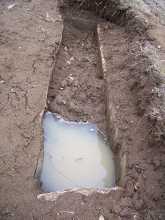Unfortunately, the problem still exists to some degree. Underpaid workers and modern treasure hunters sneak onto excavation sites, looking for artifacts that they can sell to make some quick cash on the black market. Unexcavated sites also make good targets for these thieves, as there is rarely any security to keep treasure hunters away.
As the evidence of the past is removed, those who study the past lose context and point of reference. Artifacts may be put into museums or, worse yet, private collections. This limits the ability of scholars to put historical puzzles together and discover the hidden
truths. Some things which could have come to light are now beyond knowing, thanks to past grave robbers. Destroying this window into the past is one of the greatest crimes one can commit against history.Currently, a new problem exists for historians and archaeologists. Salvage laws allow sunken ships in international water to become the property of those who find them, leading to small groups and large companies alike seeking out the sites of shipwrecks so they can be looted and their contents sold off to collectors. This means that historical finds are still under threat, though the new thieves are corporations, legally sanctioned to destroy the preservation of sites. Unless this threat is dealt with soon, many more insights will be lost, to the detriment of all humankind.

